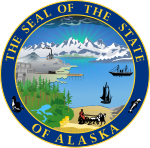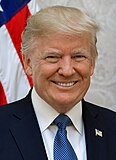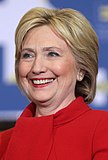2016 United States presidential election in Alaska
This article needs additional citations for verification. (December 2022) |
| |||||||||||||||||||||||||||||||||
| Turnout | 60.77% | ||||||||||||||||||||||||||||||||
|---|---|---|---|---|---|---|---|---|---|---|---|---|---|---|---|---|---|---|---|---|---|---|---|---|---|---|---|---|---|---|---|---|---|
| |||||||||||||||||||||||||||||||||
| |||||||||||||||||||||||||||||||||
| |||||||||||||||||||||||||||||||||
| Elections in Alaska |
|---|
 |
The 2016 United States presidential election in Alaska was held on Tuesday, November 8, 2016, as part of the nationwide presidential election in which all 50 states plus the District of Columbia participated. Alaska voters chose electors to represent them in the Electoral College via a popular vote, pitting the Republican Party's nominee, businessman Donald Trump, and running mate Indiana Governor Mike Pence against Democratic Party nominee, former Secretary of State Hillary Clinton, and her running mate Virginia Senator Tim Kaine. Alaska has three electoral votes in the Electoral College.[1]
Trump carried the state with 51.28% of the vote, while Clinton received 36.55% of the vote.[2] This marked a return to Alaska's streak of giving Democrats under 40% of the vote share, after Barack Obama won just over 40% in 2012. Alaska has voted Republican in every election since 1968, and since its admission to the Union in 1959, it has only voted for the Democratic candidate on one occasion: Lyndon B. Johnson in 1964.[3]
The state is known for strongly supporting third parties, including Libertarian candidate Gary Johnson in 2012; Alaska was his third-strongest state. He ran again as the Libertarian Party's 2016 nominee and appeared on the ballot in Alaska. On the day of the election, he garnered 5.88% of the vote, making Alaska his third-strongest state again after New Mexico and North Dakota.[4] Johnson's performance was the best for a Libertarian since 1980, and the best third party performance since Ralph Nader in 2000.
Caucuses
[edit]The two major parties held caucuses on different days: Republicans on March 1, and Democrats on March 26.[5]
Democratic caucuses
[edit]
| Candidate | Popular vote | District delegates | Estimated delegates | ||||
|---|---|---|---|---|---|---|---|
| Count | Percentage | Count | Percentage | Pledged | Unpledged | Total | |
| Bernie Sanders | 8,447 | 79.61% | 441 | 81.52% | 13 | 1 | 14 |
| Hillary Clinton | 2,146 | 20.23% | 100 | 18.48% | 3 | 1 | 4 |
| Rocky De La Fuente | 1 | <0.01% | |||||
| Uncommitted | 16 | 0.15% | 0 | 2 | 2 | ||
| Total | 10,610 | 100% | 541 | 100% | 16 | 4 | 20 |
| Source:[6] | |||||||
Republican caucus
[edit]| Candidate | Votes | Percentage | Actual delegate count | ||
|---|---|---|---|---|---|
| Bound | Unbound | Total | |||
| Ted Cruz | 8,369 | 36.37% | 12 | 0 | 12 |
| Donald Trump | 7,740 | 33.64% | 11 | 0 | 11 |
| Marco Rubio | 3,488 | 15.16% | 5 | 0 | 5 |
| Ben Carson | 2,492 | 10.83% | 0 | 0 | 0 |
| John Kasich | 918 | 3.99% | 0 | 0 | 0 |
| Unprojected delegates: | 0 | 0 | 0 | ||
| Total: | 23,010 | 100.00% | 28 | 0 | 28 |
| Source: The Green Papers and Alaska Republican Party | |||||
Controversy
[edit]At the Republican National Convention, Alaska's floor votes were all recorded for Donald Trump by the convention secretary, even though the Alaska delegation read their votes according to the results of the caucuses: 12 for Cruz, 11 for Trump and 5 for Rubio. An Alaska delegate challenged the results as recorded.[7] However, RNC chair Reince Priebus defended the actions of the convention secretary, saying that the delegates were bound to Trump.[8]
General election
[edit]Political landscape in Alaska
[edit]The state of Alaska has given its electoral votes to the Republican ticket in every election year since 1968 and only once to a Democratic ticket since statehood. However, in 2012, it had the largest swing in favor of the Democratic Party with President Obama only losing by 14 points compared to his 2008 loss by 22 points.[9] This has been explained by the presence of Alaska governor Sarah Palin running on the 2008 Republican ticket (as John McCain's running mate) and not in 2012.
Alaska also has a history of supporting third-party candidates at the presidential level. Alaska was the second-best state for Ross Perot in the 1992 election, awarding him 28% of the vote. Alaska was Nader's strongest state in the 2000 presidential election, giving him 10% in his presidential bid.[10] Alaska was also the third-best state for Libertarian nominee Gary Johnson in the 2012 election, giving him 2.46% of the vote, behind Johnson's home state of New Mexico, and Montana.[11] For this reason, Alaska has been considered to be one of Libertarian party nominee Gary Johnson's strongest states in the 2016 election.
Turnout
[edit]According to the Alaska Division of Election, voter turnout was about 60.77%, 321,271 ballots were cast out of 528,671 voters.[12]
Predictions
[edit]The following are the final 2016 predictions from various organizations for Alaska as of Election Day.
| Source | Ranking | As of |
|---|---|---|
| Los Angeles Times[13] | Safe R | November 6, 2016 |
| CNN[14] | Safe R | November 8, 2016 |
| Rothenberg Political Report[15] | Safe R | November 7, 2016 |
| Sabato's Crystal Ball[16] | Likely R | November 7, 2016 |
| NBC[17] | Lean R | November 7, 2016 |
| RealClearPolitics[18] | Likely R | November 8, 2016 |
| Fox News[19] | Lean R | November 7, 2016 |
| ABC[20] | Lean R | November 7, 2016 |
Results
[edit]| Party | Candidate | Votes | % | ±% | |
|---|---|---|---|---|---|
| Republican | Donald Trump | 163,387 | 51.28% | −3.52% | |
| Democratic | Hillary Clinton | 116,454 | 36.55% | −4.26% | |
| Libertarian | Gary Johnson | 18,725 | 5.88% | +3.42% | |
| Green | Jill Stein | 5,735 | 1.80% | +0.83% | |
| Constitution | Darrell Castle | 3,866 | 1.21% | N/A | |
| Reform | Rocky De La Fuente | 1,240 | 0.39% | N/A | |
| Write-in | 9,201 | 2.89% | N/A | ||
| Total votes | 318,608 | 100% | +1.17% | ||
Boroughs and census areas that flipped from Democratic to Republican
[edit]- Prince of Wales–Hyder Census Area (largest city: Craig)[22]
Boroughs and census areas that flipped from Republican to Democratic
[edit]- Haines Borough (largest census-designated place: Haines)[22]
By congressional district
[edit]Alaska has an at-large congressional equivalent to the statewide results.
Electors
[edit]Alaska had 3 electors in 2016; all of them voted for Donald Trump for president and Mike Pence for vice president.
The electors were:
See also
[edit]- 2016 Democratic Party presidential debates and forums
- 2016 Democratic Party presidential primaries
- 2016 Republican Party presidential debates and forums
- 2016 Republican Party presidential primaries
- United States presidential elections in Alaska
References
[edit]- ^ "Distribution of Electoral Votes". National Archives and Records Administration. Archived from the original on January 9, 2019. Retrieved November 23, 2020.
- ^ "Alaska Election Results 2016 – The New York Times". Retrieved November 29, 2016.
- ^ "Alaska has a long history of voting strongly Republican for president. Will it continue?". Anchorage Daily News. November 6, 2016. Retrieved December 14, 2020.
- ^ "2016 Presidential Election Statistics". Dave Leip’s Atlas of U.S. Presidential Elections. Retrieved March 5, 2018.
- ^ Kitchenman, Andrew (February 12, 2016). "How and when do Alaskans get to weigh in on presidential candidates?". Ktoo.org. Retrieved November 13, 2016.
- ^ The Green Papers
- ^ Carlson, Emily. "Chairman of Alaska's Rep party said he doesn't know why 28 delegates went @realDonaldTrump but "it's going to be corrected in record" @ktva". Twitter. Retrieved July 23, 2016.
- ^ Kopan, Tal; Payson-Denny, Wade. "Why Alaska's delegates were counted for Donald Trump". CNN. Turner Broadcasting System, Inc. Retrieved July 23, 2016.
- ^ Silver, Nate (December 5, 2012). "Alaska: Future Swing State?". The New York Times. Retrieved July 31, 2016.
- ^ Azari, Julia. "The States That Love (And Hate) Third-Party Candidates". FiveThirtyEight. FiveThirtyEight. Retrieved July 15, 2016.
- ^ "2012 Presidential General Election Results - Alaska". Dave Leip's Atlas of US Elections. Retrieved October 24, 2016.
- ^ "Voters history by age report" (PDF). elections.alaska.gov. Retrieved February 4, 2023.
- ^ "Our final map has Clinton winning with 352 electoral votes. Compare your picks with ours". Los Angeles Times. November 6, 2016. Retrieved November 13, 2016.
- ^ "Road to 270: CNN's general election map - CNNPolitics.com". Cnn.com. November 8, 2016. Retrieved November 13, 2016.
- ^ "Presidential Ratings". The Rothenberg Political Report. Retrieved August 16, 2021.
- ^ "Larry J. Sabato's Crystal Ball » 2016 President". Centerforpolitics.org. November 7, 2016. Retrieved November 13, 2016.
- ^ Todd, Chuck. "NBC's Final Battleground Map Shows Clinton With a Significant Lead". NBC News. Retrieved November 13, 2016.
- ^ "2016 Election Maps - Battle for White House". RealClearPolitics. Retrieved November 13, 2016.
- ^ "Electoral Scorecard: Map shifts again in Trump's favor, as Clinton holds edge". Fox News. November 7, 2016. Retrieved November 13, 2016.
- ^ "The Final 15: The Latest Polls in the Swing States That Will Decide the Election". Abcnews.go.com. November 7, 2016. Retrieved November 13, 2016.
- ^ "GEMS ELECTION RESULTS". www.elections.alaska.gov.
- ^ a b "Alaska Presidential Results by County, 1960-2016|Maps". thecinyc. Archived from the original on January 25, 2021. Retrieved August 31, 2020.









